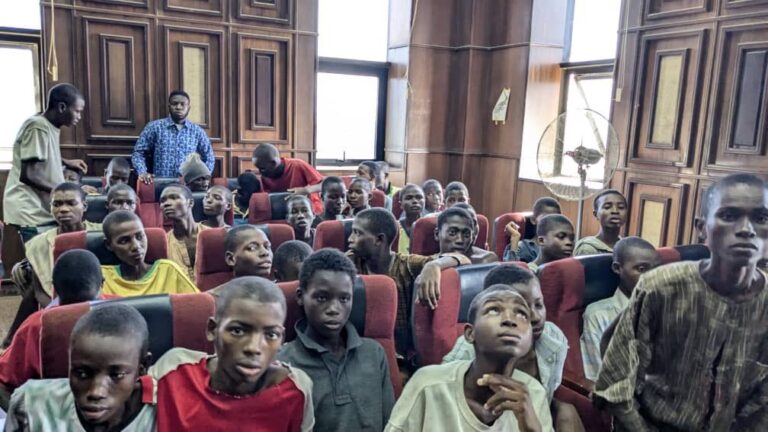President Bola Tinubu has ordered the immediate release of dozens of minors who were detained and arraigned for participating in the August #EndBadGovernance protests across Nigeria. The presidential directive comes amid widespread public outrage over the detention of 72 young protesters, some for as long as eight weeks.
The announcement was made on Monday by the Minister of Information and National Orientation, Mohammed Idris, following the swearing-in ceremony of seven new ministers at the Presidential Villa. The directive marks a dramatic shift in the government’s approach to handling the aftermath of the nationwide protests against economic hardship and rising living costs.
The controversy reached its peak last Friday when disturbing scenes unfolded at the Federal High Court in Abuja, where some of the young defendants, visibly malnourished and weak, collapsed during their arraignment. The minors, arrested from various states including Kaduna, Abuja, Gombe, Jos, Katsina, and Kano, faced serious charges including treason, sparking intense criticism from civil society organizations and human rights activists across the country.
President Tinubu’s intervention goes beyond merely ordering their release. In a comprehensive approach to address the situation, he has directed the Ministry of Humanitarian Affairs and Poverty Reduction to take immediate responsibility for the welfare of the released minors and facilitate their reunion with their families, regardless of their location within Nigeria.

The President’s decision comes with additional measures to prevent similar incidents in the future. A special committee, to be headed by the Ministry of Humanitarian Affairs, will be established to investigate all aspects of the arrests, detention conditions, and treatment of the minors during their time in custody. This committee’s formation signals the government’s acknowledgment of the need for a thorough review of law enforcement practices concerning juvenile protesters.
The case had already drawn significant legal attention when Justice Obiora Egwuatu of the Federal High Court in Abuja granted the defendants bail at N10 million each. This steep bail condition had further fueled public indignation, particularly given the economic circumstances that had prompted the protests in the first place.
The Attorney General of the Federation, Lateef Fagbemi, had earlier intervened in the matter, requesting the transfer of all case files to his office for review by the Director of Public Prosecution of the Federation. This move came as public sentiment reached a fever pitch, with former presidential candidates, regional socio-political groups, and civil society organizations unanimously condemning the government’s handling of the situation.
The arrests and subsequent detention of these young protesters had highlighted growing concerns about the government’s response to public demonstrations against economic hardship. The #EndBadGovernance protests, which swept across multiple states in August, were primarily focused on addressing the rising cost of living and widespread hunger affecting many Nigerian families.
This presidential intervention represents a significant moment in Nigeria’s ongoing dialogue about civil rights, economic justice, and the treatment of young protesters. The decision to release the minors “without prejudice to whatever legal processes that are ongoing” suggests a delicate balance between maintaining law and order and respecting civil liberties.
The case has brought to the forefront critical questions about the role of young people in civil protest movements and the appropriate state response to such demonstrations. It has also highlighted the need for more nuanced approaches to handling protests, particularly when they involve minors expressing genuine grievances about economic conditions affecting their communities.
As the nation watches the implementation of this presidential directive, attention will likely focus on the effectiveness of the government’s efforts to address the underlying economic concerns that sparked the protests in the first place. The establishment of the investigative committee may also set important precedents for how similar situations are handled in the future, potentially leading to reforms in law enforcement practices concerning juvenile protesters.



